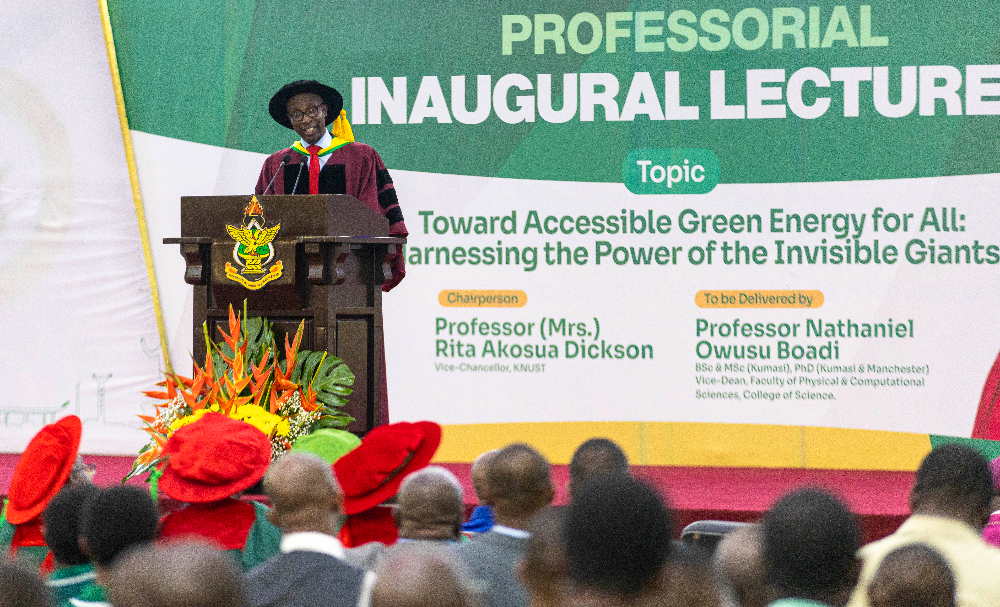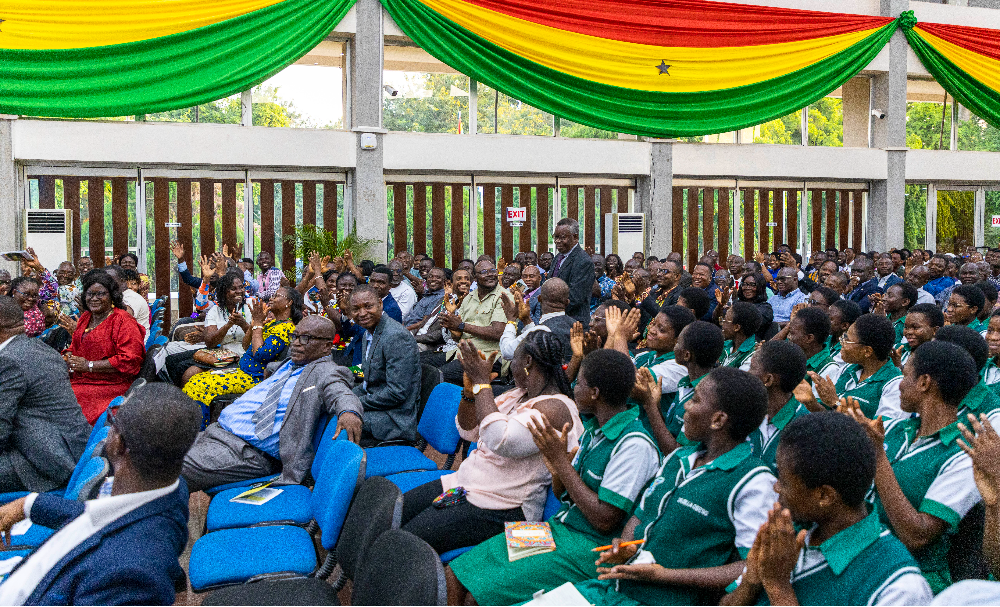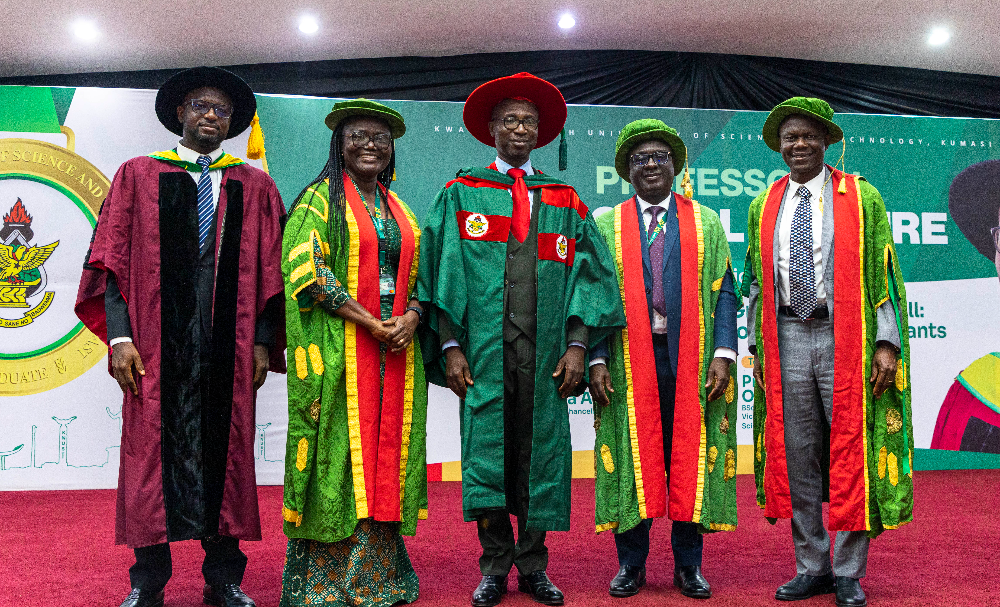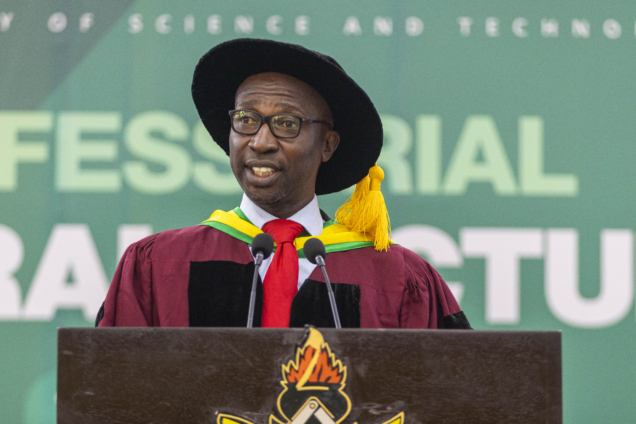
Audio By Carbonatix
KNUST scientist, Professor Nathaniel Owusu Boadi is calling on the government, industry leaders, and scientists to take bold steps toward using nanotechnology to solve Ghana’s energy challenges.
Delivering his professorial inaugural lecture, he laid out a roadmap for turning cutting-edge research into real-world energy solutions that are affordable, sustainable, and made in Africa.

The lecture, titled: “Toward Accessible Green Energy for All: Harnessing the Power of the Invisible Giants,” highlighted the promise of nanomaterials, extremely small materials engineered at the scale of atoms, as a powerful tool to transform how Ghana and the continent generate, store, and use energy.

Prof. Owusu Boadi emphasized that affordable alternatives to traditional silicon-based solar cells are within reach, thanks to advances in nanomaterials. These materials could drastically lower the cost of solar energy, making it more accessible, especially in underserved and off-grid communities.
He also spoke about the urgent need to produce these materials in environmentally friendly and sustainable ways, ensuring that Ghana’s transition to green energy doesn’t come at the expense of health or the environment.
Beyond solar energy, Prof. Boadi pointed to the potential of nanomaterials in improving energy storage systems, enhancing the performance of devices like batteries, sensors, and smart displays.
He noted that four new lead-based crystal structures developed by his research team have already been accepted into the prestigious Cambridge Crystallographic Data Centre, putting Ghanaian innovation on the global map.
“These are not just lab experiments,” he said. “They are building blocks for the future, designed right here in Ghana, with the potential to power homes, clinics, and industries across Africa.”

In his recommendation, Prof. Owusu Boadi, called on the Government of Ghana, particularly the Ministries of Finance and Energy, to make substantial investments in nanotechnology research and development, ensuring that the country stays competitive in the global race for green energy solutions.
He also urged regulatory bodies such as the FDA, EPA, and Ghana Standards Authority to create and enforce science-based safety standards for the production and use of nanomaterials. These regulations, he stressed, should protect public health while encouraging innovation.
His most ambitious proposal was for the creation of a National Nanotechnology Research Centre, backed by the Ministry of Science and Technology, in collaboration with academia, industry, and the Ministry of Finance. Such a centre, he said, would help fast-track the development and commercialization of homegrown solutions.
“We must stop being passive consumers of imported technologies,” he declared. “With the right support, Ghana can become a hub for nanotech innovation tailored to African realities.”
Latest Stories
-
The Big Bang Theory: A Scientific Beginning, Not a Denial of God
4 minutes -
The Accra Reset Initiative: Reaffirming Ghana’s Leadership and Africa’s Agency in a Changing World.
13 minutes -
Photos of firefighters battling Saturday’s Nsawam–Accra highway tanker explosion
34 minutes -
Automobile Dealers union slashes vehicle prices by 15%
1 hour -
Reparatory justice can only be achieved through determination and unity – Mahama
1 hour -
Tamale North MP launches 1Heart Women Empowerment Fund in Tamale
1 hour -
Russia killed opposition leader Alexei Navalny using dart frog toxin, UK says
5 hours -
Obama addresses racist video shared by Trump depicting him as an ape
5 hours -
Frank Davies slams Special Prosecutor as INTERPOL deletes Ofori-Atta Red Notice
5 hours -
Controller issues March 15 ultimatum for Ghana Card verification
8 hours -
Cocoa Crisis: Current challenges are self-inflicted — Oforikrom MP
8 hours -
Fuel prices set to surge as Cedi slides and global markets tighten
8 hours -
President Mahama honours August 6 helicopter crash widows with Valentine’s Day tribute
9 hours -
Vice President Naana Jane Opoku-Agyemang champions made-in-Ghana chocolates on Valentine’s Day
10 hours -
Six critically injured in gruesome head-on collision near Akrade
11 hours

